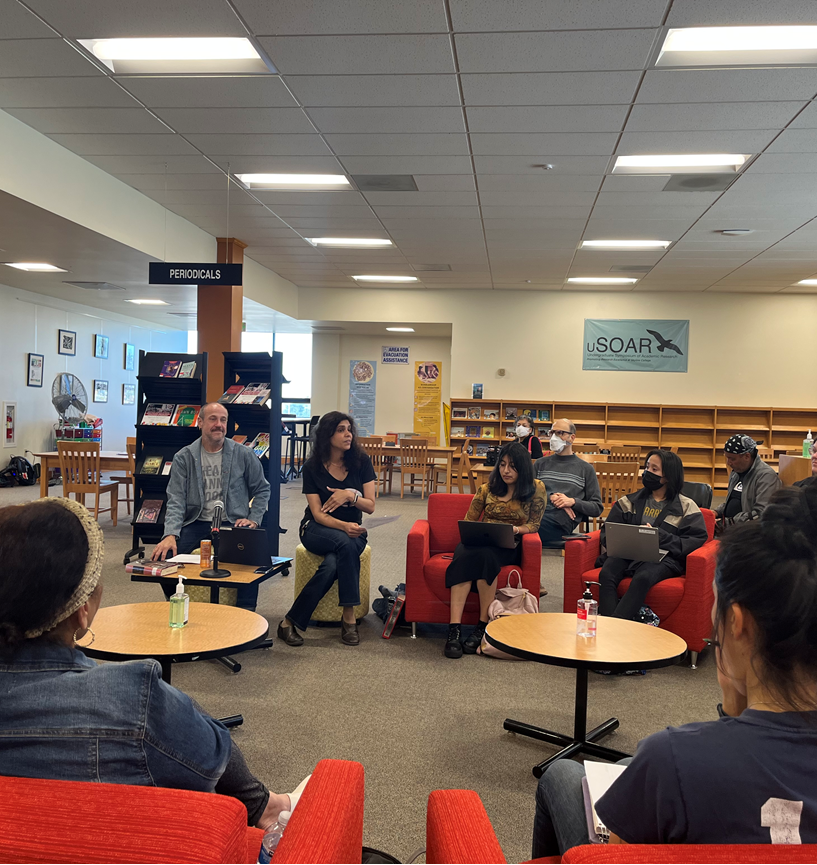On September 29, 2022, students, faculty, poets and writers came together at the Library for an international program about book banning and our freedoms of expression. Pia Walawalkar, Outreach and Equity Librarian for the College, explained the impetus for the program — the recent attack on Salman Rushdie by someone who had read only two pages of his famous novel, The Satanic Verses. She provided background on the Ayatollah Khomeini’s 1989 fatwā calling for Rushdie’s assassination and the resulting attacks on his life and those of his translators. She also spoke of the PEN international organization which helps to protect exiled writers living in danger around the world.
Speakers emphasized that in our democratic society all of our rights are connected, noting the Supreme Court’s recent ban on our constitutional right to reproduction, and asking which rights might we lose next if we don’t take action?
Students engaged with faculty to ask, “Who is responsible for book banning?” Language Arts instructor Rob Williams then continued, “When we think of banned books we often think about books in the U.S. by white writers.” Attention on banned books has often excluded queer writers, writers of color, and international writers. Recently our nation’s teachers (and curriculum) have also come under fire, especially around the teaching of critical race theory. We must continue to bring attention to this and fight back.
Six participants read from banned works they had selected and students had an opportunity to ask questions.
Devi Laskar, feminist poet, novelist and former journalist, author of the 2019 novel The Atlas of Reds and Blues and other works, joined the group by zoom, explaining that her writings have been inspired by Claudia Rankine’s Citizen: An American Lyric and Sandra Cisneros’ The House on Mango Street, books she felt gave her permission to tackle the subjects of racism and misogyny and to “be a champion for people to write what they want.” She read movingly from Rushdie’s The Satanic Verses and Taslima Nasrin’s Lajja (Shame), banned in Bangladesh, and of the fatwā against Nasrin. “People should be reading as much as they can… It’s so unfair to these writers in particular and we need to call attention to that.”
Faculty members Rachel Cunningham (Geography) and Jessica Silver-Sharp (Library) read passages from banned books they’d experienced as teenagers; Prof. Cunningham read from Stephen Chbosky’s The Perks of Being a Wallflower (1999), commenting, “it always feels like an active rebellion to read banned books!” Jessica read the opening passage of Ray Bradbury’s Fahrenheit 451 (1953).
World languages professor Luciana Castro, who grew up under a military dictatorship in Argentina and other countries, explained how this environment of repression made her “more prone to listen and pay attention to people who were less visible but needing to be leaving their mark in history.” She introduced the group to Marielle Franco, politician, sociologist, feminist, socialist and human rights activist, who gave voice to Brazilians living in the favelas. Assassinated in 2018, Franco’s books remain banned and largely untranslated. Prof. Castro shared Franco’s words, “The roses of resistance are born in the asphalt. We receive roses, but we will be with our fists clenched speaking of our existence against the push and pull that affects our lives.”
Aileen Cassinetto, author, poet and former poet laureate of San Mateo, introduced herself as “an immigrant writer who grew up during times of martial law in the Philippines.” She recalled unprecedented human rights abuses there during the Marcos era, and spoke about how subsequent leaders (post-Marcos) altered history by revising textbooks and banning other books such that children today understand the times of repression as a “golden age” they were not.
Faculty member Susanne Schubert (Chemistry) who grew up in Germany spoke of times of repression in East Germany when many artists lived under house arrest. One such writer was poet, singer-songwriter Wolf Biermann. In both English and German, Prof. Schubert and her son Paul read Biermann’s poem “Ermutigung” (Encouragement), a work written to a friend then under house arrest. The poem speaks of staying quiet, living in between the lines.
Students voiced excellent questions for the speakers. Cuban international student Yessica explained that in her native country, countless writers have been banned. She spoke of the famous Cuban poet Dulce María Loynaz (d. 1997) who despite being exiled within Cuba, continued to fight for freedom later in life. As many of Loynaz’s poems remain untranslated, Yessica read “Roses” in Spanish and then translated the poem into English herself.
Professor Walawalkar concluded by reminding the gathering that while today we celebrate our freedom to read and speak out, if we aren’t vigilant our rights can be taken away from us. “Perhaps it’s actually our obligation to read. Maybe that’s our quiet revolution.”
Note: Book displays featuring banned books around the Library will remain in place through October 21. All members of the Skyline College community can check out library books; no library cards are required. You are also encouraged to donate a banned book to the Free Library box built by Professor Kaplan-Biegel’s journalism students. You’ll find it in the Library foyer by the glass wall display. More information is available here: bit.ly/WritersUnderAttack.
Article by Jessica Silver-Sharp







